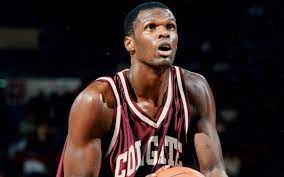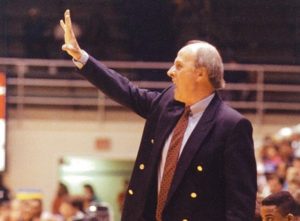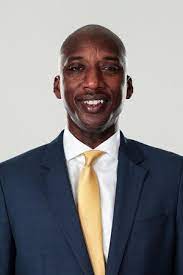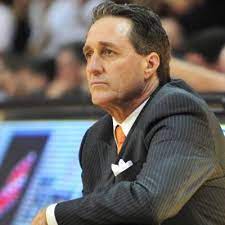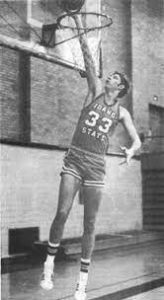When you think about Central Arkansas basketball the 1st name that usually pops into your head is Scottie Pippen, but Clifton Bush put up even more impressive stats during his 4 years with the Bears. As a sophomore he scored 16.8 PPG, as a junior he set a school record with 682 PTS in 1 season, and as a senior he got it done on both ends of the court with 19 PPG/1.8 SPG. In 2004 he was inducted into the Central Arkansas Sports Hall of Honor. HoopsHD’s Jon Teitel got to chat with Clifton about playing in back-to-back NAIA title games and having a long pro basketball career overseas. Today is Clifton’s 52nd birthday so let us be the 1st to wish him a happy 1!
As a kid you were a loyal attendee of future Hall of Famer Sidney Moncrief’s summer camp: what made Sidney such a great player, and what was the most important thing you ever learned from him? Sidney was an all-around player who could score yet also play great defense. He was a great team-first player who never seemed to worry about stats: he just played hard and was a winner.
You were born in Pine Bluff: what made you choose Central Arkansas? I was recruited out of Watson Chapel High School with 2 of my teammates (Irving Roaf/Kevin Kegler). We had heard of UCA by word of mouth through some friends and knew that Scottie Pippen had played there. We thought we could go there and do the same things we did as high schoolers. We wanted to be the star players 1 day and lead our team to multiple championships with all 3 of us in the starting 5. It was away from home yet still close enough that we could drive home on weekends or during school breaks if we wanted to.
In the 1991 NAIA title game you scored 16 PTS in a 3-PT loss to Oklahoma City: how close did you come to winning the game, and what was the feeling like in your locker room afterward? We came really close and thought we played well enough to win…but a few missed shots by us and made shots from them in the latter stages of the game was the difference. Nobody other than our team/coaches/fans thought that we could win because every player at the time except 1-2 guys who did not get much playing time for OKC was a big-time D-1 recruit. However, what they did not know was that almost all of our players (including our subs) were also D-1 recruits who chose to play NAIA or had transferred from an NCAA school, so we were just as talented but without the recognition or big names they had. After the game we were disappointed to say the least but we knew that we would be even better the next year. That was our motivation to get back and work that much harder during the offseason. Although I made 1st-team All-American it was not enough for me and my team to make it so far and come up short. We had no tears: just the motivation to get back to the title game next season.
In the 1992 NAIA title game Oklahoma City had a 9-PT OT win to finish 38-0: how good was McDonald’s All-American Eric Manuel, and do you think that you would have ended their 54-game winning streak if Joe Sitkowski had not fouled out in the 1st 20 seconds of OT? Manuel was a tough player who had the body of Karl Malone and the outside shot of Steve Kerr. He had everything that NBA scouts look for in a draft pick in my opinion. If “Big Joe” had not fouled out we might have won that game…but it was what it was. Our entire team (especially me) should have given Joe better support that night: he carried us offensively after we had shared the offensive load as a team all year long. Many of my teammates would lead us in scoring from game to game but our shots just were not falling that game.
You remain the all-time leading scorer in school history: did you realize at the time how prolific a player you were, and do you think anyone will ever break your record? I never thought of myself as a prolific player: all I wanted to do was beat the hell out of anyone that stood in my way! Whether it was Pippen or even Michael Jordan himself: I wanted to win and outplay that person. I always tried to be the best player on the court and took it as a personal challenge whenever I played against the other team’s best guy. I refused to believe that anyone was better than me on the court: if I had felt differently then I would not have been the player I was. I think records are meant to be broken but my record at UCA is special. I was a starter for all 4 years and averaged double-digits in each of those years, so if someone is going to break it they will need to be an NBA-caliber player.
You were a 2-time All-American: what did it mean to you to win such outstanding honors? It still means the world to me because it is the top honor any player can receive. It means you are 1 of if not the best players in the country, which was always 1 of my goals: to be the best.
After college you played professionally in New Zealand and remained there for a couple of decades: what is the biggest difference between college and pro basketball, and what do you like most about New Zealand? The biggest difference between college and pro basketball is the pressure to constantly perform at a very high level. In college I found that I could depend on my teammates to carry the load when I was not having a good game. As a professional most teams are depending on you to dominate every single game you play, and if you do not live up to that expectation then you not only may lose a game but lose your job as a paid player. I loved every minute of playing like there was no tomorrow because it might be my last-ever game, and as a result I had an awesome career overseas. What I like most about New Zealand is that no matter where you go in the country you are never far from the beach, and when you throw in a safe environment for raising children it is just an awesome place to be!
In 2001 you led the National Basketball League in scoring: what is the secret to being a great scorer? The secret is having the competitive drive to be the best: if you have that then you will always be successful. It is like my favorite quote: “If you want to be the man, you have got to beat the man!” It just means that if other players think they are better than you, try to go out and prove them wrong by beating them.
Your children Maria/Clifton III play basketball: who is the best athlete in the family? I would say that my daughter Maria is the best athlete, but my son CB III has all the skills to be a great player: I am sure that he will be 10 times better than me.
After retiring as a player you became a basketball coach in New Zealand: how did you get into coaching, and what do you hope to do in the future? I got into coaching as a result of playing professionally overseas: it was part of my contract to go out into the community and schools to help coach kids of all ages as well as adults. I loved it and thought back to the days when Sidney had summer camps for us where nobody had to pay. I said that 1 day I would give back to my community like my childhood hero had, so I became a volunteer coach and later accepted an offer to become a paid coach while also continuing my volunteer work. It is not a fortune but there is nothing like doing something that you love: Anything Basketball!!




